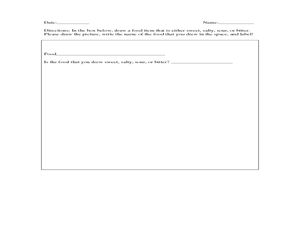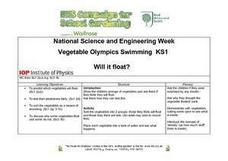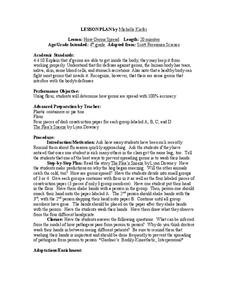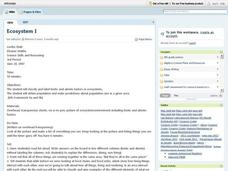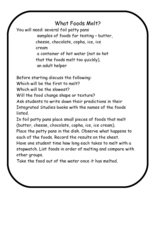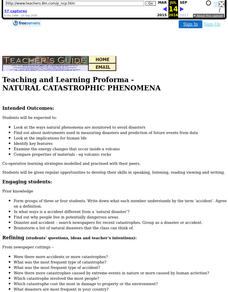Curated OER
Terrific Taste Buds
Learners explore descriptive writing by eating food in class. In this descriptive word lesson, students assess different foods in class such as jelly beans and utilize their vocabulary to describe the taste. Learners read the story...
Curated OER
Air Pressure and Wind
Fourth graders explore weather by reading weather measurement text. In this barometer lesson, 4th graders discuss ways weather is measured on Earth and how these measurements lead to predictions. Students read assigned text, discuss...
Curated OER
Cooking Lesson
Fourth graders taste different flavors on their popcorn. In this taste bud lesson, 4th graders make predictions about taste and dip popcorn into four different flavors. They record how the flavors tasted - sweet, salty, bitter, or sour.
Curated OER
Vegetable Olympic Swimming: Will it Float?
Learners inspect nutrition by conducting a science experiment in class. In this vegetable identification lesson plan, students examine a group of different veggies and predict whether they will sink or float in a tub of water. Learners...
Curated OER
Investigation 8 - Weather Forecasts
Fourth graders examine how to predict and evaluate weather forecasts. Discuss with students why weather predictions are important to us. Ask them what people do after they hear a forecast. They brainstorm reasons forecasts are important...
Curated OER
Static Electricity Experiments
Pupils investigate static electricity. They conduct two experiments, make observations and predictions, collect and record data, and write a report describing the findings of their investigations.
Curated OER
String Instruments and Pitch
Students make predictions and explore how pitch is altered in string instruments. In this acoustic science lesson, students learn the types and parts of string instruments and create their own. They listen to classical music and identify...
Curated OER
Buried Treasures
Young scholars, in teams, generate and research questions about Canada's receding glaciers. They then hold a 'press conference' in which each team provides answers for questions in their area of research. Finally, they pool their...
Curated OER
How Germs Spread
Fourth graders investigate how germs spread in this lesson. They listen to "The Flea's Sneeze" by Lynn Downey and make predictions on why the hog began sneezing. They then conduct an experiment using flour and paper cups demonstrating...
Curated OER
Cell physiology and chemistry
Students design an experiment to discriminate between chemical diffusion, osmosis, facilitated diffusion and active transport through a membrane. Be specific about predictions and interpretations!
Curated OER
Oxidation and Combustion: Chemical Reactions in Fire
Students study oxidation and define vocabulary pertinent to it. In this oxidation lesson students make predictions and create experiments
Curated OER
Measuring and Recording Weather
Students examine instruments used to measure weather, record the data, and post it to an online weather report. They include a 24 hour prediction, keep a weather log, and graph the data.
Curated OER
Aquatic Habitat Water Quality Experiment
Fifth graders discuss the importance of water quality for humans and fish and make predictions about what happens to water that is polluted. In small groups, they conduct experiments to compare and contrast water that is unpolluted and...
Curated OER
The Role of Density in Sinking or Floating: Relational Causality
Students consider density and how it affects sinking and floating. Students make predictions, test liquids, and observe why some liquids sink and others float. They perform experiments to determine relational causality and how liquids...
Curated OER
Fracture Fundamentals: A Cheesy Analog
Students make small cuts (fracture nuclei) in processed cheese food and then apply stresses perpendicular or parallel to the cuts to see how fractures grow. They make predictions before each experiment and explain their results to the...
Curated OER
On the Microbe Trail: An Introduction to Bacteria and Aseptic Technique
Tenth graders predict the conditions necessary for bacterial growth, test their predictions and at the same time practice the aseptic techniques and safety procedures needed when working with bacteria.
Curated OER
Astronomy and the Cold War: How the United States Used the Moon to Target the Soviet Union
Students examine how astronomical observations were used to help target sites in the Soviet Union during Cold War and why such targeting was needed. Students then make predictions and observations of same astronomical events for their...
Curated OER
Ecosystem I
Learners classify and label biotic and a-biotic factors in ecosystems. They define population and make predictions about population size in a given area. They describe the a-biotic factors' importance and impact on the other elements...
Curated OER
Hatching Brine Shrimp
Learners experiment with temperature and salinity to detect favorable environments for hatching brine shrimp eggs. They make some predictions about which environments will yield the most hatched brine shrimp and record the number of...
Curated OER
Night of the Twister
Students use reading strategies for Night of the Twister. In this reading strategies lesson, students name five major catastrophes and books about each. Students complete a vocabulary section, make inferences and predictions, read the...
Curated OER
Solar Kit Lesson #1 Solar Cell Inquiry
Students use a selection of solar panels, lamps, motors, and an AA battery to get as many motors or lights to operate as they can in an allotted time period. For each successful arrangement, they draw a diagram of their setup, label the...
Curated OER
Kinetic Vs. Potential Energy
Eighth graders listen to a teacher lecture and observe a demonstration of both potential energy and stored energy. After discussing the characteristics and examples of different types of energy, 8th graders make predictions and then...
Curated OER
What Foods Melt?
In this science worksheet, students experiment to determine which foods melt using hot water in metal pans. They write predictions about which foods will melt and which will melt the fastest. They perform the experiment and note the what...
Curated OER
Natural Catastrophic Phenomena
Sixth graders examine the ways natural phenomena are monitored to avoid disasters. They find out about instruments used in measuring disasters and prediction of future events from data.


